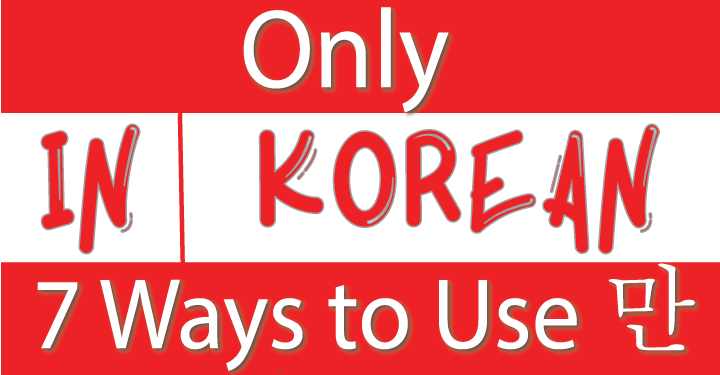
7 Ways to Use 만 “Only” in Korean Conversation
만 is “Only” in Korean. 만 may take the place of or replace several different particles in Korean. 만 may also be attached to nouns and particles in Korean.
“Only” in Korean with Nouns
The most common use of 만 is to attach it to a noun to mean “Only.” Ex. Only apples
만 Korean Grammar Construction:
Noun + 만
| Korean | English |
| 사과만 | only apples |
| 저만 | only I |
| 과학만 | only science |
| 게임만 | only video games |
Korean Sample Sentences
사과만 있어요. = There are apples only.
저만 먹었어요. = Only I ate.
저는 과학만 공부했어요. = I only studied science.
그는 게임만 해요. = He only plays video games.
Learn Korean Language Tips
Make sure you attach 만 to the correct word or your meaning could be completely different than what you expected.
Korean Sample Sentences
토마스만 사과를 먹었어요. = Only Thomas ate apples.
토마스 사과만 먹었어요. = Thomas ate apples only.
“Only” in Korean with 은/는, 이/가, & 을/를
The topic particles 은/는, subject particles 이/가, and object particles 을/를 may be added to 만 but they are not usually used.
Take a look at the sample sentences from above with these particles added.
Korean Sample Sentences
사과만이 있어요. = There are apples only.
저만은 먹었어요. = Only I ate.
저는 과학만을 공부했어요. = I only studied science.
그는 게임만을 해요. = He only plays video games.
“Only” in Korean with More Korean Particles
만 may be attached to a variety of Korean particles after they are attached to nouns.
만 Korean Grammar Construction:
Particle + 만
| Korean Particle | Korean | English |
| 에 | 에만 | only to/in/at |
| 에서 | 에서만 | only at/in/from |
| 에게 | 에게만 | only to (someone) |
| 한테 | 한테만 | only to (someone) |
| 에게서 | 에게서만 | only from (someone) |
| 한테서 | 한테서만 | only from (someone) |
| (으)로 | (으)로만 | only by/by means of/with |
Korean Sample Sentences
고등 학생들 PC방에만 가요. = High school students only go to the PC room.
그 개 밖에서만 놀아요. = That dog plays outside only.
선생님은 토마스한테만 사탕 줬어요. = The teacher only gave Thomas candy.
그녀는 영어로만 해요. = She only speaks in English.
“Only” in Korean with Verbs
Verbs can often be nominalized, made into nouns, by adding ~기 to the verb stem. By doing this you can then add 만 to a verb.
만 Korean Grammar Construction:
Verb Stem + 기만
| Korean Verb | Nominalized Verb | Korean | English |
| 달리다 | 달리기 | 달리기만 | only running |
| 듣다 | 듣기 | 듣기만 | only listening |
Korean Sample Sentences
달리기만 아파요. = Only running hurts.
듣기만 어려워요. = Only listening is difficult.
“Only” in Korean with Adverbs
Sometimes you may attach 만 to adverbs as well.
Korean Sample Sentences
빨리만 가세요. = Just go quickly.
맛있게만 요리해 주세요. = Only cook it deliciously, please.
“Only” in Korean with ~고 있다
만 may be used with the present progressive form(verb+ing) in Korean.
만 Korean Grammar Construction:
Verb Stem + 고만 있다
| Korean | English |
| 먹고만 있다 | only eating |
| 공부하고만 있다 | only studying |
Korean Sample Sentences
저는 먹고만 있어요. = I am just eating.
저는 공부하고만 있어요. = I am only studying.
“Only” in Korean with ~야
~야 is “Only if” in Korean. You can add 만 to ~야 for emphasis.
만 Korean Grammar Construction:
Verb Stem + 야만
Korean Sample Sentences
공부해야만 이해할 수 있어요. = Only if you study, will you be able to understand.
운동해야만 돼요. = It works only if you exercise.
[mailmunch-form id=”290776″]
